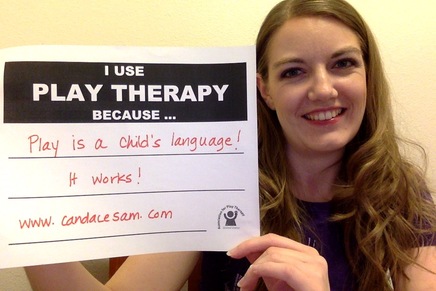|
We're celebrated Play Therapy this week! I thought I would share a little about what I know and why I do what I do! I know I've posted this video before through twitter and other social media outlets, but for those of you who have not watched it, I encourage you to do so and explore more about Play Therapy. It's not a traditional "talk therapy" but this is exactly why it works. “Play is the child’s language.” (Association of Play Therapy). Children learn and explore through play. I believe an appropriate way to process traumatic events or intense feelings is through this technique. Therapy in general is about meeting people where they are at. Children have not yet developed that level of processing or verbal skills to explain what they are feeling, but instead play it out. Play is where children are at. At the beginning of the week I posted a great article about just playing with children. According to a study done by Kansas State University, children do actually learn through playing with their parents. Children can learn about courage, learn they are capable, learn to connect and learn to count.
It's important as parents to spend that one on one time with them without devices and without interruptions so they will be happier and develop into a "mentally healthy adult." In the spirit of summer coming up, I found several very interesting activities you can do with your children at home! Check out my pinterest page entitled "Kids Stuff" to see activities such as filling eggs with paint and throwing them at canvas, making moon sand, doing ice chalk during the summer, flight school, and sharpie dishes. Important activities with your kids are such that inspire creativity, imagination, and possibly cooperation with others or independent worked. Please leave comments of activities you enjoy with your kids! Pinterest page: https://www.pinterest.com/candycane881/kid-stuff/ Referenced article: http://psychcentral.com/news/2015/04/19/improve-parenting-skills-by-remembering-how-to-play/83720.html#.VTWP4NxR_So.facebook “Play is the child’s language.” (Association of Play Therapy)
Play therapy is therapy through the use of toys and playing. Toys are used as a language for children to teach and explore. The purpose of play therapy is to express feelings, work on behaviors and learn appropriate problem-solving and decision making skills. Play therapy also helps kids learn to socialize and relate more to others. Play therapy closes the communication gap. Younger children are not developed enough to express exactly how they are feeling through languages. What they are saying is expressed and explored through themes that might develop during play therapy. For example, a child who has been in a car accident may crash cars together. Similarly a child experiencing a divorce in the family, issues are seen in how the toys communicate with each other possibly through arguing or yelling. Play therapy works by children exploring and “playing out” different scenarios until they have resolved or “processed” what is going on. Children are also able to take on different, various roles in plays such as a victim or a super hero. Children are encouraged to play out scenarios in a safe place. Play therapy encourages expression with as few limits as possible. Play therapy research shows this mostly benefits children ages 3 to 12, but play therapy also has beneficial elements that can be used with adolescents and adults. Why do I choose play therapy? I personally love play therapy because I’ve seen it work. Kids are much more willing to sit down with providers if they are on the same level. Most kids are unable to sit down and “talk it out” for an entire hour. Play therapy invites a more relaxed setting and can deepen a relationship with the therapist by letting them into the child's world. Play is a child's work, and what better way to work on mental health than using their language. |
Categories
All
Archives
April 2016
|


 RSS Feed
RSS Feed
